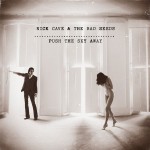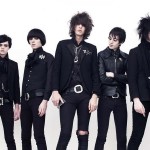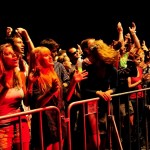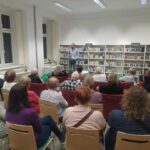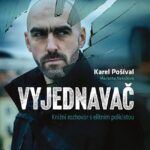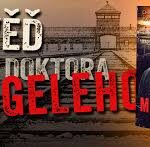
Generic press interview
- 1. To what extent is this new album a creative document of your life here in Brighton in 2012?
The way I go about writing records is that I make a calendar date to start the new record so I have nothing. I don’t have a bunch of notes that I bring into the office, I start with nothing at all. And I actually had a notebook that was made for me by a girl from Sydney: she’d made this boutique notebook for me because she’d heard me complaining about the fact that notebooks don’t open flat so I write in them, then try and play the lyrics on the piano but they (claps his hands together). So she designed a notebook that would open flat so that I could play the piano and sing from the notebook and that was this empty notebook that I took into the st
udio on that particular day and started writing the record. As it turned out that notebook became essential in the process of making the record and ended up documenting the writing of these songs in a very minute way because it became the only thing that I wrote the songs in. I’ve always done a lot of research around the songs that I write so there are pages and pages and pages of writing and you can see these songs emerging. When they got to a place that I thought they were ready, I would type them out on my typewriter on the back sheets of old books – I tore out the back sheets, typed on them and then glued it into the book. So you had these anatomies of songs in this book and those songs were very much connected to where I was at the time which was in my office in Brighton and writing these songs. It took a long time to write but it was the summer in some of that so I was outside in my basement patio, which is mentioned on occasions, writing the stuff out there as well. So ultimately the record is about time and place but it’s also about the nature of songwriting on some level. The songs are very often about the process of writing the song I’m singing about
- 2. How do the contents of your notebook turn into songs?
We started off doing some kind of jam things twice or maybe three times before we actually went into the studio. Now that doesn’t mean working out songs, that means just sitting around with three of us or sometimes four of us and just jamming and we’d get all that information and me and Warren would listen to it and discard 90 per cent of it and keep certain bits that sound like they have some sort of potential. I’d take them back and use them as basic tracks – they’re not even chordal or anything – to sing over. So I’d get some kind of atmosphere that would go behind the lyrics but they’re not songs. And then we don’t go near those songs until we go into the studio and we sit down and we say “we’re going to this song now” and we play that groove or whatever it might be: ‘it’s based on this, these are basically the chords’ and then we record it. Some of these songs people haven’t played them through when they’re recorded, like ‘Higgs Boson Blues’ is something that no one had played through. I’d never sung the whole song through because it’s a journey that particular song: lyrically it’s a journey and musically it’s a journey as well that’s a slow-building thing. There’s that sense of not knowing where that song’s going that makes that interesting to listen to that we would have lost if we’d tried it two or three times once we’d worked it all out. So the musicians are just following the singing and I don’t even know what the singing is supposed to be doing anyway: I’ve just got a bunch of lyrics which I’m actually editing as I’m singing. So there’s a sense of newness and adventure and spontaneity to the recordings of most of that stuff.
-

Nick Cave & The Bad Seeds, zdroj: Oficiální facebook interpreta 3. When you start work on a new album what makes it a Bad Seeds album rather than a Grinderman project?
Anything that I’m doing I’m writing specifically for a particular project. So I’m sitting down in the office and writing songs for the next Bad Seeds record. I’m not going ‘oh that’s a Grinderman one’ and putting that aside for when we do Grinderman, I just don’t work in that way. I was not trying to write anything that was remotely like Grinderman anyway so if I started writing something that felt like a Grinderman song I would dismiss it immediately.
- 4. This album is peopled with many female characters, do you feel it has a more feminine perspective?
I think there’s very much a feminine kind of aspect to this record not so much because of what I was bringing to the record but what I was discarding. I’d just been doing so much Grinderman stuff and I’d written ‘Bunny Munro’ and all of this stuff which was preoccupied with the male thing. They were male records, they were kind of neurotic, sexually charged male records. So if I was sitting in the office writing this one and I started thinking along those terms I would discard that stuff and I was trying to find other stuff. Writing is a kind of erotic exercise on some level because it’s living in the imagination; it’s a transformative exercise and I’m preoccupied with that sort of thing. So I guess it took a feminine bent on some of it.
- 5. Are the characters in your songs based on real people?
Well I would say that they’re just me and if I’m writing about my wife – which I often am – I don’t know anything about my wife. I spend a lot of time with my wife and she spends a lot of time with me but I’m not sure that we know that much about what actually goes on inside each other, I don’t think any of us really do. So when I’m writing about my wife I’m really writing and either observing her from my point of view or if I’m writing about things from her point of view, it’s just me dressed up as my wife (laughs gently). And I think that that’s the same with all of the songs: there is a sense of going into that imaginative space that is about transforming myself from what I am into something different.
- 6. Is your wife happy to inhabit your songs in this way?
Well that’s the pact isn’t it? The Faustian pact between the writer and the muse: there’s nothing sacred in the relationship, everything gets shared ultimately. You might get immortalised in some songs but also every little sacred moment gets churned up and spat out as songs. She loved this record: I’ve never seen her more affected by something that I’d done, immediately, and she’s in it a lot, she’s on the cover.
- 7. How did that cover photo come about?
That photo on the cover is a complete fluke; that was not something set up. My wife was doing a photoshoot for something else with Dominique Issermann who took that photograph, The French photographer, who we are great friends with. She was in between changing costumes and she was naked and I walked in – it’s my bedroom they’re shooting in – and Dominque said “open up that window”. So I walked over and opened it up and she went ‘click click’ and then she went “Now fuck off!”. And we were just looking through the photos of Susie and we were like, ‘wow, this photo’s turned out well, it’s great, it’s a cover!’
- 8. The lead out track for this album was ‘We No Who UR’: this song and the woodland video feel quite impenetrable…
You know I don’t really want to pin – particularly that song – down what was going on when I wrote that but I knew what the little birds were, and I knew who the trees were and all the rest of it. But once the music got put to it, it opened up a lot and it became about a much wider, more interesting, ambiguous sort of thing. I know I’m not really telling you anything about it but it’s not just ‘hey we know who you are and we’re going to come and get you’. It became something about something much broader. The video as well is just this existential, thoughtful sort of video that you can watch and you can take from it what you want to take from it.
- 9. There is another video online for ‘We No Who U R’ which illustrates how you edit your lyrics?
My idea was to have these lyrics redacted so that what you’re seeing on that YouTube thing is actually the typed lyric when I’m actually recording the song and stuff is crossed out. I asked my art department to redact the lyrics that I wasn’t actually singing and someone there thought it might be a nice idea to redact them but that if you looked long enough you could actually see what they were. My objection to it was that people are going to keep asking ‘hey why didn’t you say that and why didn’t you say that?’ But that editing process is absolutely fundamental to writing a song. The editing of a song is largely what makes the song to me and I think that actually if I had started going ‘I want you to burn’ it would have pinned that song down to a particular thing and made it a smaller idea than what it is, and by leaving that off it’s much more open.
-
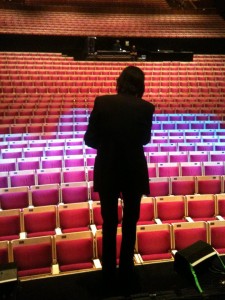
Push The Sky Away tour Australia, zdroj: Oficiální facebook interpreta 10. You said at the start that this album is concerned with your exploration of the songwriting process itself; at what point in that process does the editing take place?
‘Higgs Boson Blues’ for example has massive amounts edited out and I haven’t done that before I’m sitting down at the piano. I’ve just got this bunch of stuff and it gets played through, I sing it and I guess the first question is ‘how long is the song?’ An editing process goes there within the time it takes to play the song again which is literally 30 seconds: I’m like ‘OK bang, bang, bang’ and I’m taking this out and this out and this out. I don’t even really know the consequences of taking out those things, it’s just done fast, that’s just the way I do it – and intuitively. Later on I listen to it and these things kind of clunk together and it’s like ‘Oh wow, that’s interesting’ or ‘that’s mysterious’. So much of the writing is about juxtaposition anyway, of putting one disparate image and sticking it on top of another and the shock value or the discomfort in that. That style of kind of guerrilla editing does that in a really nice way sometimes.
- 11. You make huge cultural, historical and imaginative leaps in ‘Higgs Boson Blues’ so how did you go about selecting these images and then linking them all together in this song?
The narrative of that song is that someone is travelling and witnessing these different vignettes of spiritual collapse: like Robert Johnson and selling the soul at the crossroads or Martin Luther King being shot at the Lorraine Motel or the Caliphates’ persecution of the Jews in the 14th Century or whenever it was; these different things, these random spiritual catastrophes, let’s say, being thrown up. And Hannah Montana lying in her pool in Toluca Lake is a modern day version of on some sort of Nick Cave level. So I am able to pull out things there because there were just a whole load of other things that he was visiting along the road in ‘Higgs Boson Blues’.
- 12. In ‘Water’s Edge’ you create a picture of typical British seaside life, local boys meet visiting girls…
It’s based actually on a fertility rites poem, a primitive one: I don’t know how many hundreds of thousands of years old this particular poem was that I read but it was about ‘We’re there and we’re the men and we have our erect penises and they’re the women over there and we’re running down and they have blood running down their legs and we’re leaping on top of them!’ It’s just mind-boggling this thing. So basically I was writing a modern day fertility rites: they’ve got iPods but what goes on is not dissimilar. The essential aspect of that particular song, ‘Water’s Edge’ is not so much what’s going on down on the water’s edge but that it’s about someone watching what’s going down on the water’s edge, like an old guy watching what’s going on down there. So many of the songs actually are about watching the narratives and that’s what I was trying to say before, they’re about writing the narratives.
- 13. Do all your songs start with a visual image rather than a story?
The way I take in the world is by seeing it; that is very much evident in the songs that I write. I’m unable to write that kind of song that doesn’t have a visual element which most songs don’t. There’s that kind of song, ‘Whoah baby I love you’ which don’t have a visual element but they have a very strong emotional element and these are the great songs to me. These are those ones that you put on and they just make you feel great, they work on that level. And one of my regrets, if I have any, is that I’ve never been able to write those sorts of songs. I have to be able to see the thing that’s going on that I’m writing about or else it just doesn’t make any sense to me. So unfortunately I personally don’t like other people doing those kinds of songs. I don’t like those songs where you have to listen to a story to get into the song. I don’t want to have to pay attention to music in that way, I just want it to hit me in the heart and do what music’s supposed to do. So I’ve had to try and find a way over the years of writing narratively that doesn’t really require you to sit down and work out what the story’s about. You’re brought into a sequence of images that have that emotional resonance but it’s irrelevant what the actual story is and it’s taken me maybe 13 albums to work that out.
- 14. Do you think the blending of real and imagined worlds in your songs helps your audience interpret them in their own personal way?
Everything gets sort of put through the mill of the imagination and transformed into something else. But it’s authentic in the sense that I feel very much connected to what I’m writing about and what I want is when people listen to my stuff, that they’re drawn into a world for a while and then they can go on with their own world when they stop listening to it. It’s what I look for when I’m going to see somebody’s paintings. If I want to go and see El Greco’s paintings you’re drawn into a particular world and a particular way of seeing things – elongating the human body or whatever – the way he sees things, it’s his way of seeing it. But it brings up huge amounts of stuff for me as well and I hope on some little, smaller level that what I do can have that ability.
- 15. There’s a strong sense of real location in the song ‘Wide Lovely Eyes’ – like a home movie – yet it has a mythical quality to it…
I do look out the window of where I live and it’s about my wife walking through this garden and then there’s a little tunnel and then you see it comes out onto the seafront down there. So it’s just basically about that but what I was trying to say is it gets put through this imaginative mill and turned into something else altogether.
-
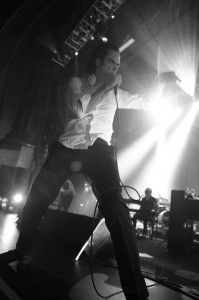
Push The Sky Away tour Severní Amerika, zdroj: Oficiální facebook interpreta 16. There’s a sense of humour in your lyrics that appeals to me: I like the line about driver alertness, husband alertness and mermaid alertness courses in ‘Mermaids’…
I was actually on a driver alertness course because I totalled my car into the speed camera down on the seafront down there – famously! I am the toast of Brighton for taking out that particular speed camera, for a while at least. And I guess I was writing that song at that driver alertness course rather than doing the driver alertness course! So there were some lines about “I am at a driver alertness course,” and then there was the husband alertness course and mermaid alertness course.
- 17. Is ‘Jubilee Street’ based on the real street of that name here in Brighton?
To be honest I thought Jubilee Street was a different street! (laughs) I got it wrong. And then I found out that Jubilee Street was the street with Carluccio’s and the library and it didn’t really match the street that I was trying to conjure up. So it’s a Jubilee Street of the imagination, shall we say, and obviously the street that this guy’s walking up with this sorry kind of affair that he has with this whatever she is, working girl… Don’t go down to that Jubilee Street to find any action like that, (laughs) you’re going to be very disappointed!
- 18. Is there a useful cross-fertilisation between your songwriting and your creative side projects?
There’s a certain element of agreeing to do something that you don’t really know how to do, like scriptwriting, that was initially ‘yeah, I’ll try and write a script.’ You write it and you go ‘hey I can do this,’ and there’s a certain amount of excitement about that. And then you write another one and there’s maybe ‘OK, I know how to do that now,’ and you just find you’re a fucking scriptwriter (laughs) which is the sort of dog of the industry! So it takes you away from the real business which is the Bad Seeds: it takes you away from that and it’s such a relief to come back to it. I’ve been working on ‘Lawless’, this film which took up so much time in the end – so much energy, so many battles with so many different people with so many agendas – that just to sit in a room with the guys in the Bad Seeds, musicians that talk on a whole different level, with your friends with no other agenda really than just making some music, it’s such a relief, I can’t even tell you. So it brings the joy back into playing music I guess.
- 19. How influential is Warren on how your music sounds?
Me and Warren work together now musically on everything, that’s how it is at the moment and it’s this weird collaboration that we have quite late in life, especially for me, that’s incredibly fruitful. So we’re working on film scores and it’s such a privilege for me – I’m not getting all ‘oh it’s such a privilege to work with the guy’ and all that – but really to be at this point in my songwriting career and to have someone that I can work with, that can bring something new, push and open the whole thing up again is an absolute godsend. I am and always have been a collaborator. I always have worked musically with other people. I’ve always worked in that way but I’ve never worked with anyone so intensely as Warren on things; what he’s brought to this record is massive and he co-writes all the songs with me. But in terms of where he’s getting these sounds from, that’s a mystery to everybody. I think it may even be a mystery to him on some level (laughs gently) because when you ask him ‘what is that?’ he doesn’t seem to know or he doesn’t want to tell you. But his loops are extraordinary because they’re organic, they’re not electronic and they’re very, very dense and very, very detailed.
- 20. The Bad Seeds have been around for some 30 years now, what’s the secret of your longevity as a band?
It used to steamroll ahead and people would fall away but it seems to have started to turn around and look. And so people like Barry Adamson who left the band a long time ago, who I’ve kept in contact with – as I keep in contact with most of them – I said ‘Do you want to come in and play bass?’ And he said ‘Yeah, absolutely’. I asked Blixa to come in and play on this record which he really wanted to do as well but it turned out that he was unable to do it. But now, in a way, it feels like the Bad Seeds past and present are a community rather than a bunch of ex-members.
- 21. What do you get out of live performance?
The whole performing live thing is another way to become someone different than you actually are. And I think we all probably want to do that or be able to do that in whatever we do; if we can do something well we feel elevated by that in some way. Going on stage and doing it in front of a whole lot of people you feel that very intensely: you feel it very intensely for a very short, compact time and then you don’t feel it any more. That feeling of becoming something else, something better – it’s exhausting undergoing those transformations each night after night after night. At the end of the day you just want to watch TV (laughs gently) and not have to deal with any of it, not have to deal with yourself. That’s the problem with touring, really, is that you’re concentrating on yourself so much.
- 22. After all these years and 15 albums under your belts, is it hard to choose which songs to perform?
You’ve got to work out how to play the songs live and it’s a whole different thing because you now know the songs and you’ve got to stop the songs from solidifying. Some you can keep alive – there are songs that I’ve kept alive for 30 years now like ‘The Mercy Seat’. I can always drag that out at a gig and it doesn’t matter what we’re going through at the time or what style of music we happen to be playing, we can always do ‘The Mercy Seat’. And it comes out different and it stays alive that song, which I guess is testament to a good song – and Johnny Cash can do it and it works with him. Other songs just die, they die very quickly, they don’t have whatever it is, they’re not good songs actually, in that way, and you find that out when you play live. So you learn 30 songs and you end up only playing 15 of them.
-
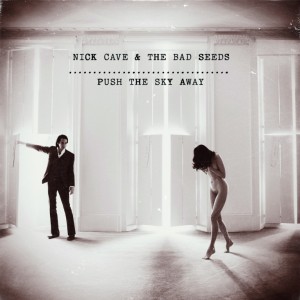
Zdroj: www.nickcave.com 23. You’re playing many sellout concerts this year; have you been pleased by the enthusiasm for this tour?
People are really excited about the fact that the Bad Seeds are playing live again and there’s a real demand for it. We were actually really surprised by that. We’re not so aware of things like that, you’re really the last people to know about the effect that you can have on people. People don’t tell you so it’s always a surprise when you find out. Even though people are saying it’s the birth of live music all over again, it’s actually difficult in these times to sell out in that way or it can be quite difficult.
- 24. The album ends with the title track ‘Push The Sky’ and the line “Some people say it’s just rock‘n’roll but it gets you right down to your soul”. Did you intend that line to sum up the whole record?
There’s something really reductive about that line after ‘Higgs Boson Blues’ and all of this journeying through time and place that you’ve been talking about before. It telescopes down into something fundamental and I was very, very pleased with that as a line to be released from the record, even though it’s kind of throwaway and not the sort of line I write, and it’s not a visual line.
- 25. Is there a narrative to the order of songs on this album?
The sequencing came about a lot easier than some of the other records. It had its natural flow that we discovered when we were actually recording, but the songs for sure do have a vague abstracted narrative within the sequence of the songs. So they’re kind of joining hands and characters flip from one to the other. Mostly because of the atmospheric consistency of the sound, it ended up very much like a record that you put on and you enter and you go through a sequence of songs and you go into a new world, a different world, and the final song releases you from that world.
- 26. You are releasing a vinyl version of this album; is that because you hanker after the old, traditional way of hearing a new record, flipping it over half way through?
The great thing about the albums was there were four feature songs: the first and the last song of each side – that’s where the strong songs were put and the rest in the middle was generally filler. I wouldn’t like to say which of those songs are like that at this point in time, that reveals itself a little further down the line. But you could understand an album in that way a lot easier than the CD format where you don’t know what to listen out for if you want to find out quickly. But this is an old school record in the sense that the songs bolster each other up and refer to each other and on some level need to be listened to as a bunch of songs.
- 27. Do you think people are still prepared to listen to an album from start to finish?
The idea of the single song is very much what it’s all about these days. People just go on and find the featured track or whatever is posted up on YouTube or wherever and that’s what people are looking for. People are not largely that interested in the album as a whole thing anymore. Certain people can get away with it I think and there’s room for those people but largely, unfortunately, it’s become a redundant format. My manager, when he heard this the first time – he came into the studio and we played him the record – commented “So what you’re expecting people to do is to sit down for 40 minutes and listen to this whole record.” And I said “Yes.” And he goes “OK, alright we’re going to have to work on that one,” but he saw that as a challenge. It’s not a given thing anymore, it’s something that’s a challenge in that respect because it’s no longer done, there’s no time available to do that anymore.
***ends***
Interview by Sally Stratton
Conducted in Brighton, January 2013

